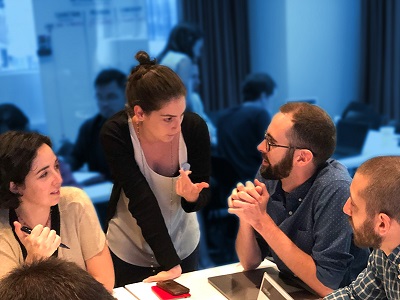Are you a startup founder based in an emerging or developing economy? Learn from seasoned entrepreneurs to solidify your understanding of open source, leverage open source market strategies to develop financial sustainability, and develop tangible skills in designing open source business models, setting the stage for revenue generation.
The UNICEF Innovation Fund provides investment and support to frontier technology solutions that address the biggest challenges facing children today.
This course is designed for open source companies receiving investment from UNICEF’s Innovation Fund, and, in the spirit of open source, it is made available to any startups exploring the possibility of going open source.
Learning Objectives
At the end of the course, you will be able to:
- Describe how open source can help startups overcome typical challenges
- Choose between different open source licenses based on your startup's needs
- Identify potential market strategies for your open source business
- Design your own open source business model canvas
Audience
- Startups that are part of UNICEF’s Innovation Fund portfolio
- Startup companies in emerging and developing markets
- UNICEF staff (country offices, Regional Offices, and HQ) interested in understanding open source
Length
It should take you about 2.5-4 hours to complete this self-paced course.
Methodology
The course is divided into 5 sessions:
Session 1: Introduction to the course.
Session 2: Defining a Sustainable Business Model for Future Markets
- Challenges that startups typically face
- What is open source?
- How open source can make a startup more competitive
- Myths and misconceptions about open source
Session 3: Adopting an Open Source Approach and Market Strategy
- Key elements to consider when going open source (repositories, forums, licensing)
- Open source market strategies
- Exit options for open source companies and why larger companies may pay a premium for open source acquisitions
Session 4: Opportunities and Challenges of Open Source as a Market Strategy
- Primary benefits of open source for businesses
- Challenges of open source and how industry leaders address them
Session 5: Developing and Executing Your Open Source Business Model
- Market research to validate your idea
- Generating a business plan and using the business model canvas
- Iterating effectively with your business model canvas
- Funding sources for open source businesses in the international development context
Structure
This course is composed of 5 modules:
- Introduction
- Defining a Sustainable Business Model for Future Markets
- Today’s Market
- A Market Strategy to Prepare You for the Future
- Case Study: UFORA
- Myths and Misconceptions
- Adopting an Open Source Approach and Market Strategy
- Overview of Open Source
- Open Source Repositories
- Open Source Forums
- Licensing
- Open Source Market Strategy Options
- Exit Options for Open Source Businesses
- Opportunities and Challenges of Open Source as a Market Strategy
- Benefits of Open Source
- Challenges of Open Source and How to Mitigate them
- Deep Dive: RedHat and RedCrow
- Developing and Executing Your Open Source Business Model
- Step 1: Research
- Step 2: Plan
- Step 3: Finance
- Step 4: Build
- Step 5: Assess and Iterate
Contact details
For content-related questions please contact Cheryl Ng DPG Capacity Building Specialist
